We are currently witnessing the largest and most rapid escalation ever in the number of people being forced from their homes.
Millions of people are fleeing conflict in Syria, Iraq, Afghanistan and Ukraine, as well as persecution in areas of Southeast Asia and Sub-Saharan Africa, creating the highest level of displacement since World War II. Why are people fleeing? Where are people going? How are host countries responding? On this page, you can find our latest coverage, the background behind the crisis, and interactive maps.
Compiled by Emmeline Booth
Please go to our new website to see all our latest migration coverage.
The Aegean’s nameless dead
Migrants who reach the Greek island of Ikaria rarely arrive there alive (John Psaropoulos)
“The girl was lying across the beach, her face down in the pebbles,” says municipal plumber Pantelis Markakis as we walk to the water’s edge. “What shocked me was when I saw that her hands were turned like this and white like stone,” he says, turning his palms upwards and gnarling his fingers. “I asked a coastguard officer if she was wearing gloves.”
Why warships can’t solve the refugee crisis
Another week, another project scrawled on the back of a napkin to try to solve the refugee crisis. This time it’s ‘send in the warships’.
The panicky decision to involve NATO is not only an unprecedented step in the militarisation of Europe’s borders but also fits into the long-term trend of viewing refugees and migrants arriving by boat as an emergency that can only be addressed with increased border security.
Turkey’s refugee smugglers adapt and prosper
In the main square of Aksaray, a neighbourhood in Istanbul densely populated by refugees, Haroun Yamani tries to placate potential clients who are seeking a future in Europe but are anxious about the treacherous boat journey that will take them there...
Stop scapegoating Greece
As the Greek islands continue to receive around 2,000 migrants and refugees every day, despite treacherous winter sea conditions, many other European countries are trying to prevent their onward movement. Greece is increasingly isolated and under pressure.
SOMALIA OFFERS YEMENIS A SAFER HOME
Somalia is the new home for 30,560 people who have fled the fighting in Yemen and are trying to adjust to life in a country that – while no longer written off as a “failed state” – certainly has its challenges.
““I was fleeing war, conflict, destruction, famine and lack of economic opportunities. But I don’t see much of a difference here in Somalia””
EU laws designed to deter refugees
A new Danish law that will allow police to search asylum seekers arriving in the country and confiscate any cash or valuables worth more than 10,000 kroner ($1,460) has been widely condemned by refugee and human rights groups. But it is only the latest among a raft of new laws introduced by EU member states in the past six months aimed at deterring asylum seekers from lodging claims on their territory.
REFUGEES UNWELCOME: BORDER CLOSURES AND FREEZING TEMPERATURES
A group of young Iranian migrants who have been stranded at Greece's border with Macedonia for three days, try to keep warm around a small fire (Dimitris Tosidis/IRIN)
Refugees and migrants attempting to pass through the tiny village of Idomeni near Greece’s border with Macedonia are paying the price for the introduction of ever more restrictive border policies by countries further north.
NO REFUGE: CENTRAL AMERICAN CHILDREN ON THE RUN IN MEXICO
In recent years, gang violence has spread across the so-called "Northern Triangle" region where tiny nations have competed for the unwanted title of global murder capital. Last year, violent deaths in El Salvador shot up by 70 percent, putting the country ahead of Honduras as the most dangerous place in the world outside of warzones. In 2015, there were 6,657 murders, a level of violence not seen since the country’s bloody civil war three decades ago. As an increasing number of children attempt to flee the violence, Mexico finds itself ill-equipped to deal with the influx.
““There are no human rights in my country. It is useless to go to the police; the only thing you can do is run.””
Salam Aldeen of volunteer group Team Humanity helps refugees disembark from a boat arriving on Lesvos (Jodi Hilton/IRIN)
Is Greece right to rein in refugee volunteerism?
Last week, five young European volunteers were arrested on the Greek island of Lesvos and later charged with people smuggling. Is this part of an overly officious crackdown on groups that are just trying to help, or a timely effort to rein in an amateur rescue effort that amounts to a dangerous free-for-all?
Failed EU relocation plan leaves refugees in limbo
Aral Kakl (right), a Kurdish Iraqi journalist, his Syrian wife Shevin, his brother Rewan and some other refugees who have applied for the relocation programme, kill time in the cafeteria of their Athens hotel (Nicola Zolin/IRIN)
The EU's September agreement to relocate 160,000 asylum seekers from the frontline states of Greece and Italy to other EU states over two years has so far been a dismal failure. Only 272 asylum seekers have been relocated in the past four months and dozens more are spending weeks or even months in Athens hotel rooms awaiting relocation.
Syrian refugees in Cologne fear backlash
Syrian refugees living in Cologne say they’re afraid they’ll have to pay the price for the actions of gangs of men, said to be of Arab and North African origin, who assaulted and robbed women in the city on New Year’s Eve. Twenty-two asylum seekers are reported to be among the suspects that German police have identified so far.
PART OF THE FAMILY: SICILIANS TAKE IN MIGRANT CHILDREN
Carla Trommino, founder of AccoglieRete, with Taha, one of the 20 unaccompanied migrant children she has fostered in the last three years (Paulo Palermo/AccoglieRete)
A network of volunteers in Sicily, one of the frontlines of Europe’s migration crisis, has come up with a hands-on approach to help the record number of teenage migrants and refugees who have been arriving on the island without an adult guardian.
NEW YEAR, NEW LOW IN EUROPE’S REFUGEE CRISIS
The beginning of 2016 has marked another low point in Europe’s response to the refugee crisis. Will the year ahead see a further race to the bottom? Or will member states learn the lessons of 2015 and find the necessary consensus to humanely manage the arrival of hundreds of thousands more refugees?
HOW 150,000 PEOPLE WERE SAVED IN THE MEDITERRANEAN
Italy's Maritime Rescue Coordination Centre is a 365-day-a-year operation that coordinated more than 930 sea rescues in 2015, saving over 150,000 lives. There are no days off. On Christmas Day, 751 people were rescued from six different boats. IRIN took a look at how sea rescue is done.
Five key challenges for new UN refugee chief
Getting back to work following the end-of-year break can be tough. But spare a thought for Filippo Grandi, who arrived in Geneva this week to begin his five-year term as head of the UN’s refugee agency.
The world’s clogged asylum system
Refugees that make it to Indonesia are often stranded there for years as they await resettlement elsewhere. But wait times are even longer now, because the crisis created by Syria’s civil war means there are even fewer opportunities for refugees in Southeast Asia to be resettled.
THIS YEAR'S NEGLECTED MIGRATION CRISES
In 2015, all eyes have been on the Mediterranean and Europe's so-called migration crisis.
But people are being displaced in many other corners of the world away from the media's glare. According to the UN’s refugee agency, UNHCR, this year is likely to see worldwide forced displacement exceeding 60 million for the first time. Take a look at six of this year's neglected migration crises:
The Bulgarian route: Between a rock and a hard place
A Bulgarian identification document discarded on one of the paths through the forest that migrants use to cross into Serbia on their way to Western Europe (Jodi Hilton/IRIN)
The migrants and refugees arriving in Dimitrovgrad, Serbia, have all opted for the land route through Turkey and Bulgaria rather than the more expensive route by boat to Greece. It is a route that is likely to become increasingly used as non-Syrian, Afghan and Iraqi migrants are barred from proceeding into Macedonia from Greece. But as the Turkish and Bulgarian border police step up controls, and numerous reports of police brutality emerge, it is an option that comes with its own risks.
Canadian Prime Minister Justin Trudeau and Ontario Premier Kathleen Wynne welcome Syrian refugees Kevork Jamkossian and his daughter Madeleine who have been privately sponsored to come to Canada (PMO of Canada)
Canada’s private refugee sponsors in the spotlight
Syria's refugee crisis has put Canada’s unique private sponsorship programme in the spotlight, both within Canada’s borders and across the world. Of the 25,000 Syrian refugees that the Liberal government has promised to resettle by the end of February, a significant number will be received by private sponsors.
“Our group has been trying to sponsor a Syrian family since September, but they’re all getting snapped up so quickly. It’s wonderful that so many people want to sponsor refugees,” said Margaret Richardson, chair of the Interchurch Refugee Group in Ottawa, which has been sponsoring refugees since 1989.
There's no place like home
Some people think refugee camps are the cities of tomorrow, but cities will definitely be the cities of tomorrow, says regular IRIN columnist, Paul Currion who urges more focus on the existing problems of urbanisation, rather than far-fetched alternatives to camps.
Smugglers are least bad option for border returnees
Give up on their dreams and go home, seek asylum from Greece’s dysfunctional bureaucracy with the prospect of deportation if they fail, or run the gauntlet of smuggling operations and plough on into northern and western Europe: the options facing thousands of migrants and refugees forcibly removed from the Greek-Macedonian border are all bad.
Syrian children among a group of refugees at Basmane bus station who were returned to Izmir after their boat was turned back (Nicola Zolin/IRIN)
Refugees defy EU-funded crackdown in turkey
The European Union's three-billion-euro deal with Turkey aimed at rapidly stemming the flow of migrants and refugees crossing to Europe from the Turkish coast has not deterred refugees from making their way to the coastal city of Izmir where smugglers continue to do a brisk trade.
Although Turkey has assured the EU it will target the business, smuggling and its associated industries continues unabated and overtly in Izmir. But there is also evidence that a crackdown has begun with more interceptions of boats carrying refugees headed for Greece.
Tensions boil over in the balkans
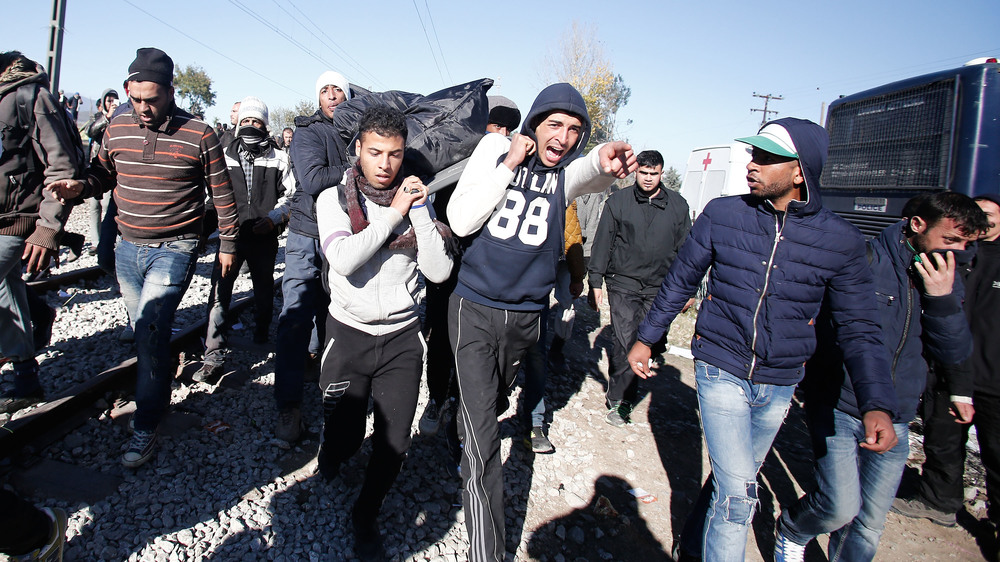
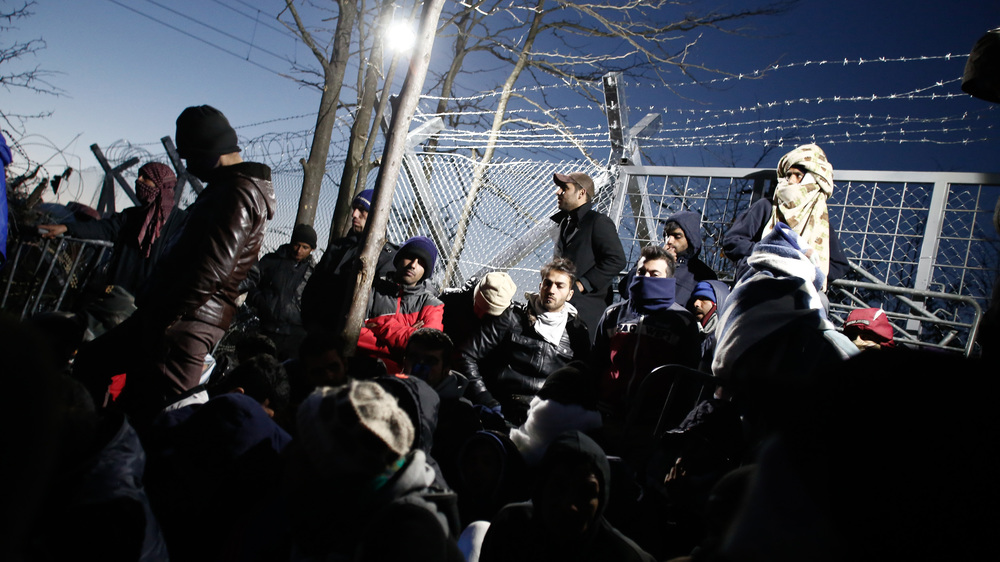
Riots broke out in the early hours of Thursday morning at Greece’s frontier with Macedonia as migrants and asylum seekers stranded there for the past two weeks blockaded the border, preventing people from Syria, Iraq and Afghanistan from crossing.
During protests that continued throughout the morning, a 20-year-old Moroccan man jumped on top of a stationary train carriage and was electrocuted after touching some cables.
Rocky road: Disabled refugees battle through the Balkans
Since the beginning of this year, more than 700,000 migrants and refugees have taken boats from Turkey to Greece and made their way to Western Europe using the so-called Balkan route. The journey is exhausting and dangerous, even for the young and able-bodied. For the injured and disabled, the risks and challenges are multiplied.
Massur Nasser pushes his friend, Gazi El Fadour, in a wheelbarrow with a flat tire in Horgos, Serbia. El Fadour lost both his legs when ISIS attacked his university in Aleppo. The two men have been traveling companions since meeting months earlier in Turkey (Jodi Hilton/IRIN)
The EU’s ‘short-sighted’ migration deal with Turkey
As it becomes clear that winter weather and stricter border controls will not be enough to deter migrants and refugees from trying to reach Europe, the European Union has reached a three-billion-euro deal with Turkey aimed at substantially stemming the influx “with immediate effect”.
The agreement, finalised at a summit in Brussels on Sunday, means that a joint action plan sketched out in October will now move ahead, despite criticism from human rights advocates and migration experts who regard it as “short-sighted” and say it poses more questions than it answers.
New border regime in the Balkans “inequitable and illegal”
In a new column, Jeff Crisp, former policy chief at UNHCR and now an advisor with Refugees International, condemns new border policies that only admit certain nationalities.
““In addition to the immense hardship and confusion it has caused, the ‘designated nationalities’ strategy constitutes an inadequate, inequitable and illegal response to the refugee challenge in the Balkans.” ”
EU starts to slam doors on asylum seekers
Two weeks have elapsed since the terrorist attacks in Paris. With the news that at least two of the attackers posed as refugees to enter Europe via Greece, a number of EU countries have taken steps to shore up their borders and restrict entry by asylum seekers, citing both security concerns and capacity problems. See our round-up of which countries have done what:
Aid to Syrians: How far does it go?
Struggling to find work and receiving little aid, many of Lebanon's 1.1 million Syrian refugees are barely getting by. An estimated 90 percent are in debt and nearly all have to make sacrifices. In this photo feature, IRIN finds out how six families make do.
Migrants stranded in the Balkans
Tensions are running high at the Greek-Macedonian border where thousands of migrants and refugees have been stranded for the past two days.
Macedonian authorities are only allowing refugees from Syria, Iraq and Afghanistan to cross the border, in the wake of similar restrictions imposed by Slovenia, Croatia and Serbia.
Migrants and refugees wave their Greek registration papers at the border with Macedonia where only certain nationalities were being allowed to cross (Dimitris Tosidis/IRIN)
Balkan countries impose "national segregation" at borders
At least three countries on the Balkan route, the main thoroughfare for migrants and refugees seeking to reach northern Europe from Greece, abruptly imposed new border controls overnight, allowing only certain nationalities to progress.
“We don’t accept that because you’re from a certain country you can’t be a refugee. They should be given the possibility to apply for asylum," said Melita Sunjic, a spokeswoman for the UN’s refugee agency, UNHCR.
Cartoon published in 1938 by the Daily Express
Look back and learn: The Evian Conference, 1938
Gathered on the calm shores of Lake Geneva, a group of 32 political representatives failed to reach agreement on how to accommodate hundreds of thousands of refugees fleeing violent oppression.
This is not the opening paragraph of a recent news report on Europe’s efforts to deal with the migration crisis and the exodus from Syria. It describes the Evian conference in 1938 when politicians, diplomats and refugee support groups came together in the French spa town at the invitation of US President Franklin D. Roosevelt.
Influxes of refugees, and conferences to determine collective response, are not new in Europe. What can today’s architects of refugee policy learn from applying the 20/20 vision of hindsight?
How the refugee crisis is hurting foreign aid
Faced with the arrival of record numbers of asylum seekers and shrinking levels of public sympathy, more and more European countries are using their foreign aid budgets to foot the bill of feeding and housing the newcomers.
"Resources for one area should not come at the expense of another," said Stephane Dujarric, spokesman for UN Secretary-General Ban Ki-moon. "Redirecting critical funding away from development aid at this pivotal time could perpetuate challenges that the global community has committed to address."
Aboud Dandachi (Jodi Hilton/IRIN)
Syrian refugees respond to their ‘worst nightmare’
If Syrian refugees in Europe do become scapegoats for the attacks in Paris then the extremists will have achieved at least one of their likely goals, Aboud Dandachi, a Syrian blogger living in Istanbul, told IRIN.
“Da’esh [IS] would love to turn Europeans hostile towards refugees; in fact it’s a top priority for them right now,” he said, explaining that the radical Islamist group “hate the fact that Europe is seen as a refuge for Muslims fleeing their atrocities.”
EU-Africa migrant plan raises worrying questions
Are European leaders forcing their own migration agenda on Africa? Why are they conflating development aid with migration policy? What is wrong with introducing more safe and legal migration routes?
From left to right, Macky Sall, President of Senegal, Donald Tusk, President of the European Council and Joseph Muscat, Maltese Prime Minister at the Valletta Summit on migration (The European Union)
Steep learning curve for refugees in Germany
Many of the 758,000 asylum seekers who have arrived in Germany this year had dreams of continuing their studies. Major obstacles to accessing higher education are not only affecting their chances of a job and proper integration, but could also have a significant impact on the German economy.
Afghans flee in droves, but Germany closes the door
In recent months, the number of Afghans making the dangerous journey to Europe has risen dramatically. Most are headed for Germany, where they are receiving an increasingly cool reception from the authorities.
“There is so much violence in Afghanistan,” said 35-year-old Hashmat Ali, standing in the queue for a passport with his three young children. “If I stay here, I will die anyway. So, why not take a chance?”
Afghans on the road to Europe
Photojournalist Jodi Hilton has met countless Afghan asylum seekers at various stages of their long journey across Europe: from the Greek island of Lesvos, through the Balkans and onward to their final destinations.
The Volunteer Effect
Historically, professional aid workers have looked askance at independent volunteer responders, regarding them as well-meaning amateurs as likely to cause problems as to be helpful. But their growing numbers, and increasing role in the frontline response in the current refugee crisis, are starting to force a rethink.
The long way round: Syrians through the Sahel
As other options narrow, a small but growing number of Syrians are attempting a new and circuitous route to Europe: flying more than 3,000 miles to Mauritania in West Africa and then travelling overland with smugglers on the ancient salt roads from Mali through the Sahara. Katarina Höije reports from Gao in northern Mali.
Comment: "We can do better" - a volunteer’s perspective of Europe’s refugee response
Marienna Pope-Weidemann never meant to become a volunteer. But she spent the last five weeks on the Greek island of Lesvos: pulling babies from the water; negotiating with the police; and becoming increasingly frustrated with the official response. Here are her thoughts on how aid agencies and volunteers can work better together.
““Their endurance, their dignity, their courage to carry on, is the most beautiful thing I’ve ever seen. They’re not victims, they’re survivors.””
The majority of Syrian children in Turkey are not in school (Eleonora Vio/IRIN)
School’s out for Syrian children in Turkey
Not so long ago, Syria had an education system that was the envy of the Arab world and was reflected in its 90 percent literacy rate. But education has become yet another casualty of a civil war now in its fifth year.
"In Istanbul only 20,000 out of 80,000 [Syrian] children have access to school and amongst them less than 30 percent are enrolled in free Turkish schools," said Suleiman Alaaraj, a Syrian staff member of the Syrian Commission for Education
Five ways Europe could save refugee lives this winter
As the death toll mounts in the Eastern Mediterranean, with stormy seas claiming the lives of at least 70 refugees in the last week of October, many of them children, the EU’s slow and fragmented response to the refugee crisis is looking increasingly ineffectual.
Volunteers try to warm migrants who have just come ashore on the Greek island of Lesvos (Jodi Hilton/IRIN)
Lebanese law forces Syrian refugees underground
A complicated set of laws has made obtaining legal residency in Lebanon so difficult that an estimated two-thirds of the country’s Syrian refugees now lack the proper papers, putting them at constant risk of arrest.
““We’re in a situation where refugees can’t work, they can’t go back, they can’t leave their homes, [but] eventually they need to eat.””
Dealing with the migrant dead
Since the beginning of this year, 2,860 migrants are thought to have died in the Mediterranean after setting off in smugglers’ boats from the Libyan coast towards Italy. Volunteers from the Libyan Red Crescent Society are left to deal with the decaying and bloated bodies when they wash ashore.
““Many of our volunteers are young people who want to help this country. It’s about humanity and wanting to help where we can.””
Red Crescent volunteers use ropes to pull a salvaged migrant body up the cliff-face on the beach at Tajoura - a Tripoli suburb (Mohamed Ben Khalifa/IRIN)
Should Europe follow Brazil’s example on humanitarian visas?
Until recently, Haitians escaping their homeland after the utter devastation of the 2010 earthquake took hazardous overland routes through South America in the hope of finding a better life in Brazil, often putting their lives in the hands of unscrupulous smugglers. Now, it’s simple: they walk into an office in the Haitian capital Port-au-Prince and apply for a humanitarian visa. No need for smugglers or sneaking across borders.
GERMANY'S REFUGEE WELCOME WEARS THIN
Images of Germans greeting refugees at Munich’s train station with cheers and teddy bears in early September were beamed around the world, but the welcome that asylum seekers receive after being dispersed to cities, towns and rural areas around the country is often quite different.
PEGIDA's first anniversary rally in Dresden attracted as many counter-protesters as it did supporters (Andrei Pungovschi/IRIN)
Refugee crisis: Another summit, another action plan
After a long summer of similar gatherings, there is a sense of déjà vu as heads of state once again agreed that “only a determined, collective cross-border approach…based on solidarity, responsibility and pragmatic cooperation” could succeed in restoring some order to the chaos that has marked responses to mass migration through the region in recent weeks and months.
IRIN takes a look at what previous summits and action plans have (or haven’t) achieved this year.
HOTSPOT 'SOLUTION' DEEPENS REFUGEE CRISIS
An EU initiative to screen and fingerprint all migrants and refugees arriving in Italy and Greece is creating chaos, particularly on the island of Lesvos where the new system is causing further delays in registering new arrivals and thousands of people have been queueing in the open for days.
LIVES ON HOLD FOR FAMILIES OF MISSING MIGRANTS
When migrants go missing on the long journey from Africa to Europe the lack of information about their fate often adds immense bureaucratic hurdles to the anxious uncertainty suffered by their relatives back home.
Baye Aly Diop's son left for Europe nine years ago and was never heard from again (Ricci Shryock/IRIN)
NON, Merci! Why refugees avoid France
While Germany expects to receive up to one million asylum seekers by the end of 2015, France is preparing for only 65,000, the same number it received last year. Why?
““What matters for refugees is to know that they have a community they’re going to.””
Relief effort for Syrian refugees in Kilis, southern Turkey (IHH Humanitarian Relief Foundation/Flickr)
The EU’s dirty deal
Rebecca Bryant, an anthropologist at the London School of Economics and an expert on civil conflict, borders, and displacement in the Eastern Mediterranean, warns that the EU’s deal with Turkey to contain the refugee crisis could have dangerous and far-reaching consequences for the region.
Briefing: The EU refugee deal with Turkey
For EU member states struggling to agree on the best response to the refugee crisis, the fallback plan has long been to look to third countries to solve the problem for them.
With the majority of migrants and refugees now arriving in Greece after a short sea journey from Turkey, it’s no surprise that EU leaders backed a draft plan to offer Turkey a tempting array of incentives in return for its cooperation in managing the refugee crisis.
The new boom aid job: cultural mediator
A by-product of the dramatic rise in the number of migrants and refugees arriving in Europe is soaring demand for a relatively new kind of humanitarian professional: the cultural mediator.
““Cultural mediators are crucial. They are a vital link between patients and doctors. There are different approaches to medicine and health treatment in the West and in the East. What we consider the heart, other cultures believe is the stomach.””
Amjad Ibrahim was only 13 when he left Syria and travelled to Sweden on his own (Sara Assarasson/IRIN)
How many refugee children can Sweden take?
Sweden is experiencing a rapid rise in the numbers of unaccompanied refugee children seeking asylum there.
In the first two weeks of October alone, well over 4,000 unaccompanied minors arrived in the country, bringing the total this year to 18,000, more than two and a half times the 7,000 that came during the whole of 2014.
What will winter bring for Europe’s refugee crisis?
Rough seas and colder weather usually signal a sharp drop in the numbers of migrants and refugees attempting to cross the Mediterranean to reach Europe. But after a summer of unprecedented refugee arrivals, this winter is likely to be different.
A child waits in line with a group of refugees on the border between Austria and Hungary at Nickesldorf (Andrei Pungovschi/IRIN)
Greek aid worker busts seven refugee myths
Europe’s refugee crisis is starting to move out of the headlines, but according to the latest figures from the International Organization for Migration, sea arrivals to Greece have actually increased from around 4,500 a day at the end of September to 7,000 a day in the past week.
Currently on leave from the UN emergency aid coordination body OCHA, Greek humanitarian worker Fotini Rantsiou has spent the last two months as a volunteer on the island of Lesvos. In this report, she looks at some of the most prevalent refugee myths and the real story behind them.
Rent to tent and back again
The image of Syrian refugees in dusty refugee camps is a favourite cliché of politicians and media alike, but most refugees live in the cities, towns and villages of neighbouring countries.
“Nobody cares whether we starve or die," said Ismail Yousif, a 51-year-old native of Hasaka, in northeastern Syria. After fleeing to the semi-autonomous Kurdistan region of Iraq in 2013, he and his family sought shelter in a refugee camp. But there wasn’t space, and sewage now seeps across the floor of his cheap rented quarters.
An urban neighborhood in Tripoli, north Lebanon, is home to both Syrian refugees and locals (Amelia Rule/CARE International)
SINCE YOU'VE BEEN GONE: The families migrants leave behind
FROM A ROCK TO A HARD PLACE
Lucky, who calls himself "Biggy", left Nigeria four years ago to make his fortune in Europe. He got no further than Morocco. He lives in tent in a forest, unable to go forward, unwilling to admit defeat and return home. Back in Nigeria he has an aged mother who prays her son will stay safe. She has no idea of the life he leads as an undocumented migrant, dodging police, living rough. She is confident that one day Lucky will get to Europe and help lift her out of poverty. Read their story.
TAKING THE 'BACK WAY' OUT
Mohammed Lamin quit his job, borrowed money from his brother, and left the Gambia for Europe via the “back way” - the highly dangerous overland route to Libya through the Sahel, and then on to Europe on a smuggler's boat. He saw no real future for himself in the Gambia and felt obligated to try to better his family's prospects. Now that he’s “made it”, his family members hope the financial sacrifice that fell on them will be rewarded, while Lamin's elder brother is preparing to follow in his footsteps. Read their story.
Cross at your peril: tough justice for refugees in Hungary
Refugees and migrants who cross Hungary's new border fence from Serbia do so at their own risk, and not just because of the razor-wire. Most are immediately detained and given a court hearing resulting in an expulsion order. Their future from that point becomes a lot more uncertain.
The humanitarian caste system?
Syrians are everyone’s new favourite refugees. But the growing perception that they receive preferential treatment from governments, volunteers and aid agencies is undermining humanitarian principles and causing serious problems for responders in Lesvos and beyond.
Shelters in Kara Tepe camp, Lesvos, Greece (Daniel Elkan/IRIN)
Shelters in Moria camp, Lesvos, Greece (Daniel Elkan/IRIN)
Humans of Syria
Objects of pity or attractive prospective employees? The Syrians landing on the beaches on the Greek island of Lesvos have some serious CVs. IRIN aid policy editor Imogen Wall spoke to some about the professional skills they have to offer Europe, and their career ambitions.
The refugee crisis: time for some perspective
At the end of a long summer that has seen record numbers of migrants and refugees arriving on Europe’s shores, EU member states are still deeply divided in their response to the crisis. This week, they agreed to relocate 120,000 asylum seekers from over-burdened frontline states like Greece and Italy to other EU countries over the next two years, despite four countries voting against the deal. This IRIN film puts this latest figure into a bit of perspective.
The Train of Hope initiative assists thousands of refugees and migrants arriving at Vienna's main train station every day (Paul Currion/IRIN)
The right way to reinvent the wheel?
Despite an EU agreement to relocate 120,000 asylum seekers over the next two years, the best hope for meeting the immediate needs of the tens of thousands of migrants and refugees already making their way across Europe often comes from volunteers working for recently formed grassroots organisations.
Paul Currion looks at how one such initiative is taking a lead in the response in Vienna.
Crossing Croatia
Since Hungary sealed its border with Serbia, refugees and migrants determined to reach northern Europe have started forging a new route through Croatia. But the small country has struggled to manage the sudden arrival of tens of thousands of people at its borders.
This photo feature chronicles the many bottlenecks impeding refugees' journeys through the country.
A volunteer helps a young Syrian girl find new shoes and socks at Miksaliste, a hub for the refugee response in Belgrade (James Haines-Young/IRIN)
Local dwarfs global in Serbia refugee response
Along with Greece and Macedonia, Serbia has become a waystation on the well-travelled western Balkan route to northern Europe, which has already been used by more than 300,000 migrants and refugees this year.
A collection of local NGOs and charities are working together to respond to those passing through the capital who are in need of food and shelter.
Is Yemen Europe’s next migration crisis?
Suddenly everyone knows about Syria as hundreds of thousands of refugees flee across Europe. But further south, another Middle Eastern country is also imploding, arguably at an even faster rate.
Will refugees from Yemen now also start to flee to Europe?
Refugees caught between razor-wire and a minefield
For the thousands of migrants and refugees streaming into Serbia with the hope of entering the European Union via Hungary, the journey ahead is littered with ever more obstacles: from a razor-wire fence and the threat of prison on one side to minefields and mountains on the other.
Refugees cram into a bus that will take them from an interim reception centre in Kanjiza, northern Serbia, to the Hungarian border about 10 miles away just before Hungary sealed off its border (András Hajdú/IRIN)
Response, or opportunism?
Several major aid agencies have announced dramatic upscaling – and funding requests – to help the European refugee crisis. But does this represent a long overdue and much-needed response or is it more about opportunism and the imposition of inappropriate response models?
How can Turkey protect itself and save Syrians?
For four years Turkey appeared to be inoculated against the Syrian crisis. The violence that ravaged its southern neighbour was largely contained on the other side of the border.
That relative calm has been shattered in recent months. As the country seeks to protect itself by restricting movement for refugees and imposing tough fines on NGOs, does it risk damaging the relief effort?
Among the scrubby grape vines outside the camp, all the detritus of human life can be found (Mark Perry/IRIN)
Short-lived calm in Macedonia’s refugee rush
Macedonia's sleepy border town of Gevgelija is still receiving as many as 8,000 migrants and refugees a day, but following the hasty construction of a temporary holding camp just outside town, the refugees are now directed away from the train station.
IRIN reports on a relatively ordered system at the border that proved short-lived.
Amateur aid: The limits of good intentions
Across Europe there has been an upsurge in spontaneous citizen and civil society-led initiatives in response to the refugee crisis. But many of these ad hoc groups are running into challenges they lack the experience to deal with.
How the EU’s refugee plan stacks up
European Commission President Jean-Claude Juncker called for “bold, concerted action” to manage Europe’s refugee crisis during his State of the Union address and outlined a raft of measures that member states will need to decide whether to adopt at their next meeting in Brussels.
This is IRIN’s take on the main proposals.
A pregnant Somali woman is helped onto an MSF boat after being rescued at sea on 23 August (Alessio Romenzi/IRIN)
Any such thing as a ‘safe’ country?
At the same time as European Union nations consider opening their doors to more Syrian refugees, they are looking for ways to close them to asylum seekers from other countries.
When home affairs and justice ministers gather for an emergency summit on the refugee crisis in Brussels, one item on the agenda will be the drawing-up of a common list of “safe countries of origin” (SCO) that would be applied to asylum seekers across the EU. But is there any such thing as a ‘safe’ country?
Over 100,000 Syrians have travelled to Europe, mostly via Greece, so far this year (Louisa Gouliamaki/IRIN)
How Europe’s refugee crisis hurts Syrian NGOs
Ask any aid organisation working on Syria their biggest problems and towards the top of every list will be one thing: you can’t get the staff, or, more accurately, you can’t keep the staff.
More than 100,000 Syrians have travelled to Europe this year as hope evaporates that the civil war will end soon. For NGOs, both Syrian and international, this includes many of their most qualified employees – leaving huge gaps in their ability to help those in need.
How will Germany house all its refugees?
As 18,000 asylum seekers arrived in Munich over the weekend, local authorities scrambled to find them all beds. Sites for trade fairs, an abandoned car showroom, even railway carriages, have all been turned into emergency accommodation. But as trainloads of newcomers keep arriving, the options are dwindling and the shortage of refugee housing has reached crisis levels.
Thousands of refugees, mostly Syrians, arrived at Munich's central train station this weekend. They all need to be found accommodation (Gordon Welters/UNHCR)
Anti-racism protests in the Israeli city of Tel Aviv (File photo) (Flickr.com/sashakimel)
In Israel, Refugees Welcome gains small foothold
The Facebook request was simple: “Man needs a home.” The actual demand was perhaps less so.
Late in August, Israeli activists began asking fellow citizens to take strangers – asylum seekers or refugees just freed from detention – into their homes.
“In a few hours, we had a long list of people from very different places all over Israel offering to help.”
European human rights court could put brakes on migrant deportations
In the face of a surge in migrant arrivals, the EU Commission has urged member states to take a tougher stance on rapidly returning migrants who don’t qualify for asylum, but a European Court of Human Rights judgement this week may make countries think twice about fast-tracking repatriations.
2,400 reasons to care
As public pressure grows on EU leaders to develop a coherent response to the refugee crisis, our Migration Editor Kristy Siegfried asks what it will take to get them to act.
She points out that as long as politicians (and the media) continue to conflate domestic immigration issues with the very different factors driving asylum seekers to risk everything to reach Europe, there is little prospect things will change.
Europe doesn’t have a migrant crisis, it has a Syrian crisis
“Imagine Syria didn't exist - that the war never happened. Suddenly Europe’s migration crisis doesn't look so bad,” writes Joe Dyke, IRIN’s Middle East editor, who has lived in Lebanon since 2011, the year the Syrian war began.
“Over the past few years,” he writes, “as the crisis in their homeland has deepened, I have watched many Syrians go through several layers of anguish before taking the painful decision to leave and try to reach Europe.”
Here today, gone tomorrow
Journalist and communications specialist Rachel Harvey recently returned from a stint providing support to refugees and migrants in Greece with the British charity ShelterBox. For aid workers responding to the constantly changing population of refugees on the Greek islands, she says, the crisis raises a set of troubling questions with no easy answers.
No way forward, no way back for migrants in Libya
Migrants in Libya are faced with three equally grim choices: they can take their chances crossing the Mediterranean in an unsafe smuggler’s boat; return home via an equally perilous route through the desert; or stay in Libya, where work is limited and conditions miserable and insecure.
Another shipwreck off the coast of Libya, this time claiming an estimated 150 lives, has made their dilemma even more urgent.
Debates over language: a dangerous distraction?
Responding to any urgent humanitarian situation, including the current inflow of migrants and refugees to Europe, involves correctly categorising and defining the problem.
But migration researcher, Melissa Phillips, suggests that agonising over labels and language risks overshadowing the need for more coordinated responses and a better understanding of what is driving people to embark on these journeys.
So much for Sanctuary: how an EU asylum rule ‘results in death’
When Austrian police opened the back of a truck abandoned on the side of a motorway to find the bodies of 71 migrants, perhaps all Syrian refugees, the failure of the EU’s Dublin Regulation was exposed.
Despite having made it into the EU’s passport-free Schengen zone, they still felt the need to travel clandestinely to avoid being fingerprinted and registered for asylum in Hungary, which would have offered them few opportunities to work or integrate.
Is it finally time for a “proper pan-European asylum strategy”?
When to use the M-word
Using the right terms when referring to Europe’s migration crisis has become a minefield for journalists.
Following Al Jazeera’s highly publicised decision to stop using the word ‘migrant’ in reference to people crossing the Mediterranean, IRIN’s migration expert Kristy Siegfried looked at four of the most common mistakes in migrant terminology.
the race to beat hungary's border fence
As Hungary rushes to complete the first phase of a controversial fence along its Serbian border, migrants – mainly refugees from Syria, Afghanistan and Iraq – are desperately trying to reach the country, which marks the beginning of the European Union’s passport-free Schengen zone. When the fence is up, entry will become much harder.
IRIN witnessed a face-off between officials and a group of around 50 Syrians – many of them women and children - at one of the main crossing points on the border.
Serbia offers brief welcome for migrants rushing to EU
As Macedonia and Hungary attempt to close their borders to migrants, Serbia remains largely welcoming.
“We can’t close our eyes like others in Europe have,” said Prime Minister Aleksander Vucic. “Refugees are safe and welcome here. Some will stay, although we know they want to go to more developed countries. If they want to stay, we have no problem – these are good, hard-working people.”
EU pays price for lack of migration planning
Migrant arrivals to Europe in 2015 were widely expected to surpass the record levels reached in 2014, as conflicts in Syria and elsewhere raged on. But the staggering number of sea arrivals to Greece in recent weeks appears to have taken many by surprise.
Greece recorded more than 50,000 arrivals in July, according to the UN’s refugee agency, UNHCR, surpassing in just one month the 43,500 who arrived during the whole of 2014.
Frontline states, transit countries and destination countries are scrambling to respond, but there is still no unified EU response.
Crisis in Kos: An unfolding Greek tragedy
The refugee/migrant crisis on the Greek holiday island of Kos is reaching breaking point.
Hundreds of migrants evicted from public makeshift camps have now been locked inside an open-air stadium with little access to food, water or toilets as authorities scramble to process their registration.
How did we get here?
Walking into danger: Migrants still head to Yemen
A civil war, precipitated by the departure of Yemen’s government and a Saudi Arabian-led bombing campaign, has made an already perilous journey for migrants even more treacherous, and yet migrants continue to travel there in the hope of reaching Saudi Arabia and lucrative employment.
“I know it’s a high risk, but I will take it,” said Fila Aden, 24, an Ethiopian migrant on his way to Yemen via Hargeisa in Somaliland.
Refugees pour into Cameroon fearing Boko Haram
Insecurity in north-eastern Nigeria and the border region has led to a surge of refugees, most of them trying to flee further into Cameroon and away from the threat of Boko Haram.
“That country was hell,” says Ibrahim Okpyeh, who fled from his Nigerian hometown of Gombe. “Never have I seen so many atrocities. These people [Boko Haram militants] killed everyone in our village. They burned my car, our homes and looted cattle.”
As more and more refugees flood into Cameroon, serious concerns around health and security are beginning to emerge.
Asylum seekers forced to rough it in Austria
Hundreds of migrants camp out on the platforms of Budapest’s Keleti station in the hope of boarding a train to Vienna. Many are stopped by the police, but for those who reach Austria, conditions at reception centres are becoming increasingly grim.
IRIN talked to asylum seekers at Traiskirchen reception centre, where even tents are in short supply and many are sleeping outside in the open.
Morocco: The forgotten frontline of the migrant crisis
“To go back is not easy, to go to Europe is not easy, to stay here is not easy,” says ‘Biggy’, a 31-year-old Nigerian migrant who has been in Morocco for four years.
For the thousands of sub-Saharan Africans arriving each year, Morocco has become a choke point in the flow across the Mediterranean, pinched by the local and Spanish governments working in tandem to halt crossings onto Europe.
PLAYING THE EU ASYLUM LOTTERY
Fleeing war or persecution for the safety of Europe? Choose your country wisely.
Asylum seekers have not truly made it until their applications are approved, giving them the right to remain as refugees or under some other form of protection. A refusal can mean removal back to the country they fled, or a life living in the shadows as an “illegal” migrant.
Migrants packed aboard a fishing boat are rescued by the Italian navy (Massimo Sestini/The Italian Coastguard)
Irregular migration threatens asylum in Europe
Are we becoming too accustomed to shocking sights of migrants trying to reach Europe through Italy, Greece, and Turkey by any possible means?
In a new column, Christopher Horwood, who has worked in humanitarian and development aid for over three decades and is the founding coordinator of the Regional Mixed Migration Secretariat (RMMS) in Nairobi, Kenya, urges EU leaders to rethink their contradictory approach to irregular migration.
"The migration and asylum debate is urgent, necessary and very thorny."
Durable solutions for refugees prove elusive
Unless lasting solutions are found for refugees, we will only see the global refugee burden increase.
Part of the UNHCR's mandate is to help governments find those solutions, but according to the UN’s Office of Internal Oversight Services (OIOS), it has been more effective at responding to emergencies than achieving so-called “durable solutions”. So where should UNHCR focus their efforts?
Hungary: A grim way station for asylum seekers
In recent months, Hungary has become a gateway to Europe for tens of thousands of migrants and asylum seekers.
The government has been doing its best to close off the route, passing new legislation enabling more deportations and building a 110-mile fence along its border with Serbia. Conditions at the country’s asylum centres are also poor and deteriorating as overcrowding worsens.
Ukrainian asylum seeker Vladislav spent three months in the closed facility of Nyírbátor. “[It] is Hungary’s Guantánamo,” he said, “they chained and handcuffed us, and gave us expired food”.
Family reunion out of reach for many refugees in Europe
Just as the number of refugees arriving in Europe is rising, member states are making it more difficult for their families to join them.
Anne Bathily, a senior policy officer at the European Council on Refugees and Exiles (ECRE), suggests that states are keen to reduce such channels as family reunification, one of the few available for refugees to come to Europe:
“When you’re uprooted, your family becomes your country; it represents everything you left behind."
Araya and her daughter (Kristy Siegfried/IRIN)
Araya's story
As family reunification becomes more difficult in the EU for refugees granted the status, IRIN spoke to a UK-based Eritrean refugee about her experience.
Araya's husband has been refused a family visa to join her, and waited almost two years to be able to meet their daughter.
“I wasn’t expecting it. He’s my husband and we have a child together.”
Migrant arrivals in Europe: 2014 vs 2015
Migrant Boat Arrivals in Europe Top 150,000 in 2015
150,000 migrants have reached Europe by sea to date in 2015, says IOM.
Almost all arrivals were registered in Italy (74,947) or Greece (75,970).
Over 1,900 migrants have lost their lives in the Mediterranean so far this year, over twice the number during the same period in 2014.
The number of fatalities has started to decrease since May, due to an increased number of search and rescue missions the large presence of European Union (EU) / Frontex ships in international waters.
Migrant fatalities by location in 2015
SYRIAN REFUGEES SURPASS 4 MILLION
Latest figures from UNHCR released today put the total number of refugees from Syria to just over 4,013,000 people.
HUNGARY: new wall under construction to protect 'fortress europe'
On Monday, Hungarian MPs passed new legislation to construct a 110-mile fence along Hungary’s border with Serbia - the main entry point for undocumented migrants and asylum seekers. In recent months, Hungary has become a gateway to the European Union for tens of thousands of migrants and asylum seekers who have already journeyed through Turkey, Greece and the Balkans in search of international protection and a better life. Hungarian authorities are doing their utmost to close off this increasingly well-trodden route.
On the migration road through Bulgaria, Serbia, and Macedonia
The number of migrants using the Western Balkans route into the EU is reaching unprecedented levels.
See our three part series following the dangerous journey taken by an increasing number of migrants through Bulgaria, Serbia and Macedonia.
Prison cells, “the jungle,” Afghan gangs, police beatings, killer trains, cramped detention centres, Albanian guerrillas, and then, of course, there’s Ali Baba’s hostage house. For migrants wanting to avoid the deadly sea crossing from Libya to Italy, the route through Macedonia has many dangers of its own. Read more.
Greek financial showdown overshadows refugee crisis
As the media focuses on Greece's debt crisis and a potential Grexit, the refugee crisis unfolding in its islands has been pushed from the headlines, but boats carrying migrants and asylum seekers continue to arrive and systems for receiving them have virtually collapsed.
Migrants and asylum seekers queue up at Mytilene Port on Lesvos waiting for police clearance (Louisa Gouliamaki/IRIN)
Q: WHAT ARE PEOPLE FLEEING FROM?
a: The Islamic State
Tens of thousands of Syrians have fled fighting in the northern city of Hassakeh, with residents describing widespread panic following a sustained assault by so-called Islamic State (IS) militants.
Migration Map
All of IRIN's coverage of the causes and consequences of Global Migration - on one map:
Background to the current crisis
According to the recent UNHCR Global Trends Report, at the end of 2014 almost 60 million people had been forcibly displaced from their homes.
Who is fleeing?
- Syria is now the world's largest producer of refugees (3.88 million), having overtaken Afghanistan (2.59 million), while Somalia comes in third (1.1 million).
Syrian Kurdish refugees cross into Turkey from Syria, near the town of Kobani. Syria's conflict, which began in 2011, has turned the country into the world’s single largest driver of displacement. (I. Prickett/UNHCR)
In Sub-Saharan Africa, overall displacement was up 17 percent in 2014, driven by civil war in South Sudan and conflicts in Somalia, Mali and the Central African Republic.
In Southeast Asia, persecution of the Rohingya, an effectively stateless Muslim ethnic group from Myanmar, has led to a refugee and people-trafficking crisis, with mass graves uncovered in jungle camps in Thailand and Malaysia and thousands left stranded on boats at sea.
After Syrians, Eritreans make up the second largest national group of asylum-seekers risking their lives to cross the Mediterranean. Almost 11,000 have arrived in Italy so far this year, and in 2014 nearly 37,000 applied for asylum in the European Union.
Who is hosting them?
Turkey is now the world's top refugee hosting country, mainly due to the conflict in neighbouring Syria. It is followed by Lebanon, Iran and Pakistan.
- In 2014, a record high of nearly 1.7 million individuals submitted applications for asylum or refugee status. With 274,700 asylum claims, the Russian Federation was the world’s largest recipient of new individual applications, mainly as a result of the conflict in Ukraine.
Greece is fast catching up with Italy as the main entry point into Europe for migrants and asylum-seekers. An average of 600 a day are now coming ashore in the eastern Aegean and a total of 42,000 have arrived so far in 2015, a six-fold increase on last year.
A migrant family comes ashore at Sklala Sykaminias. The majority of arrivals to Greece are Syrians, followed by Afghans (Giula Bertoluzzi/IRIN)
In the EU, the biggest volumes of asylum applications in 2014 were received in Germany and Sweden. Several European countries (and the United States) have been criticised for failing to take more Syrian refugees through resettlement programmes.
The Journey
Libya's civil war has opened up the country as a gateway to Europe. Many African migrants endure long, perilous journeys through the Sahara desert, often experiencing kidnapping and violence at the hands of smugglers. The ones who eventually reach Libya risk arrest and long periods of incarceration in one of the country’s 20 official detention centres – all of which are overcrowded and underfunded.
Emanuel and Jonata are held in a Libyan detention centre, they escaped indefinite military conscription in Eritrea.
Fortress Europe
European countries are divided over how to respond to the increased numbers of migrants and asylum-seekers trying to enter the EU. Hungary will soon start to fence off its border with Serbia, while Bulgaria has adopted a harsh approach to the sharp rise in the number of irregular entries from Turkey. Spain recently passed a law legalising the immediate return to Morocco of migrants and would-be asylum seekers who penetrate the fenced-off North African enclaves of Melilla and Ceuta.
Intensified border controls, push-backs and reports of abuse have not deterred migrants and asylum-seekers from continuing to try to reach Europe. When one border closes, migrants and their smugglers find other routes.
Hundreds of refugees and migrants aboard a fishing boat are pictured moments before being rescued by the Italian Navy as part of their Mare Nostrum operation in June 2014. There has been a dramatic growth in the number of refugees seeking safety by undertaking dangerous sea journeys, including on the Mediterranean (Massimo Sestini/The Italian Coastguard)
Deaths at sea in the Mediterranean grabbed the headlines earlier in the year, but only represent one aspect of the increasingly dangerous journey that migrants and asylum-seekers are undertaking to reach Europe:
Compiled and updated by Tamara Leigh & Kristy Siegfried




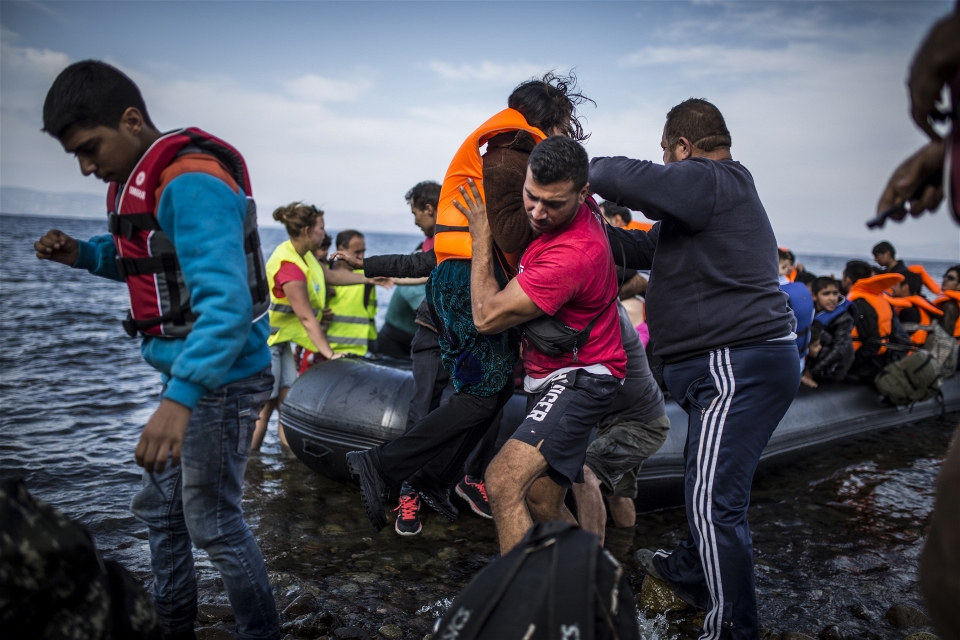




















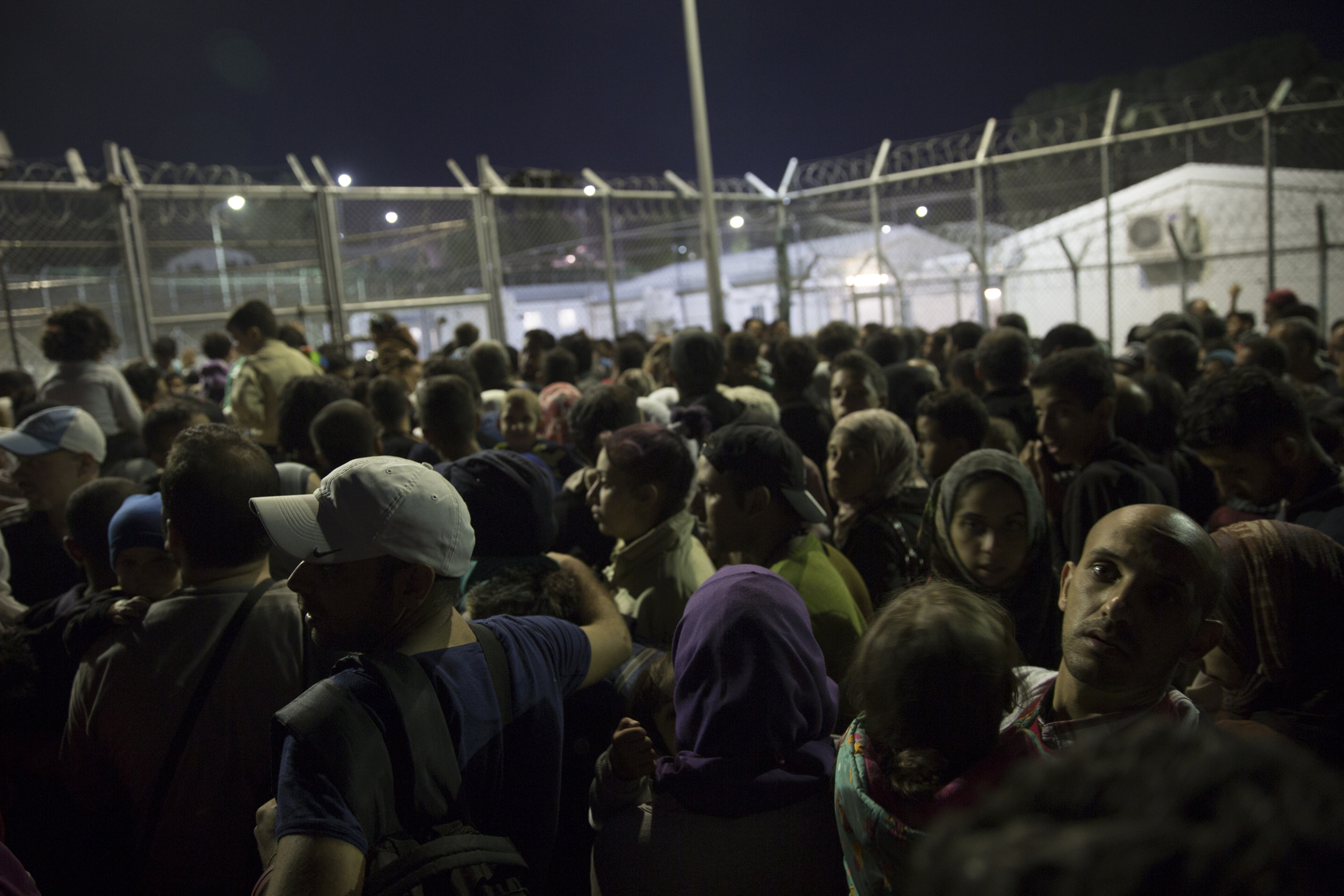
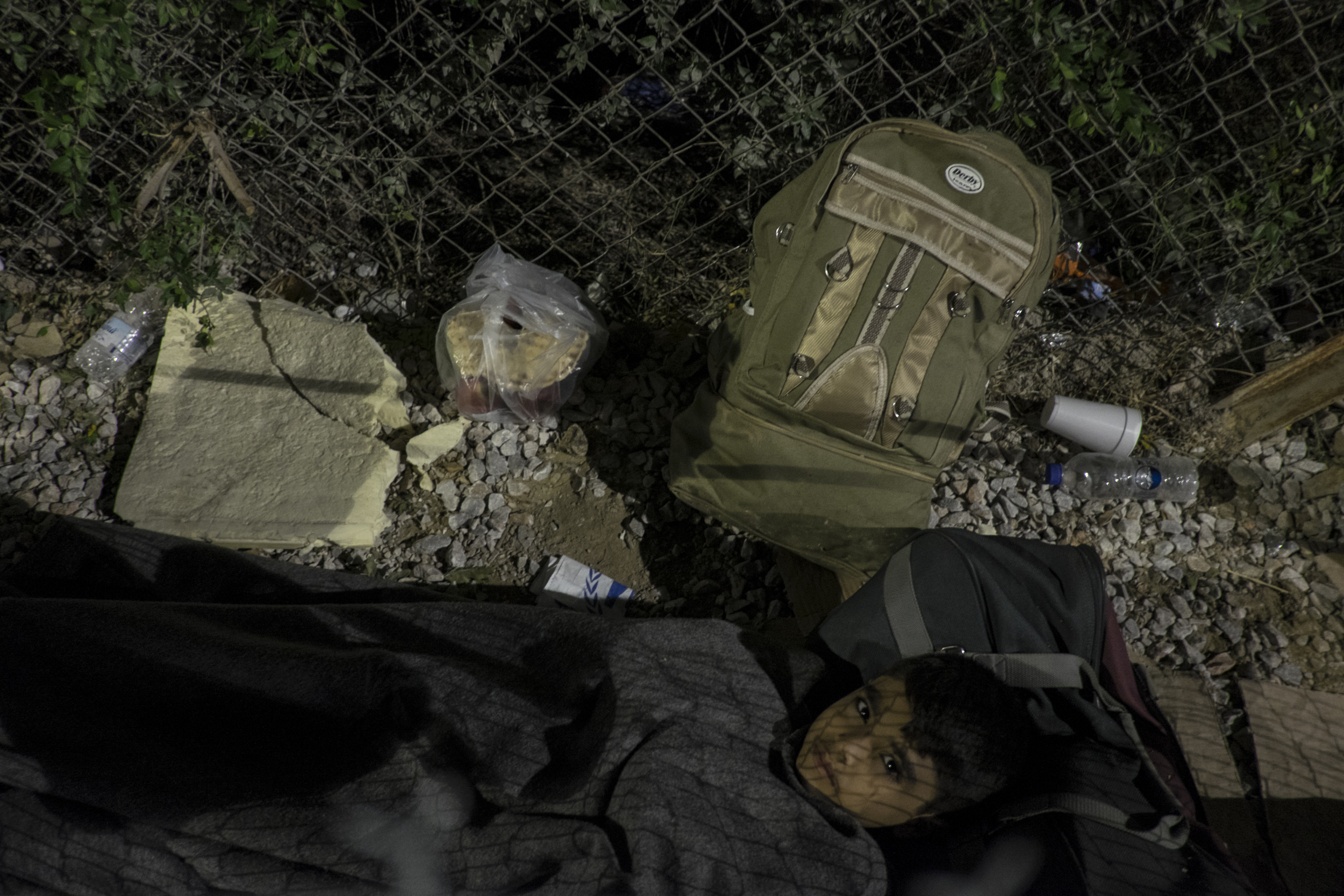















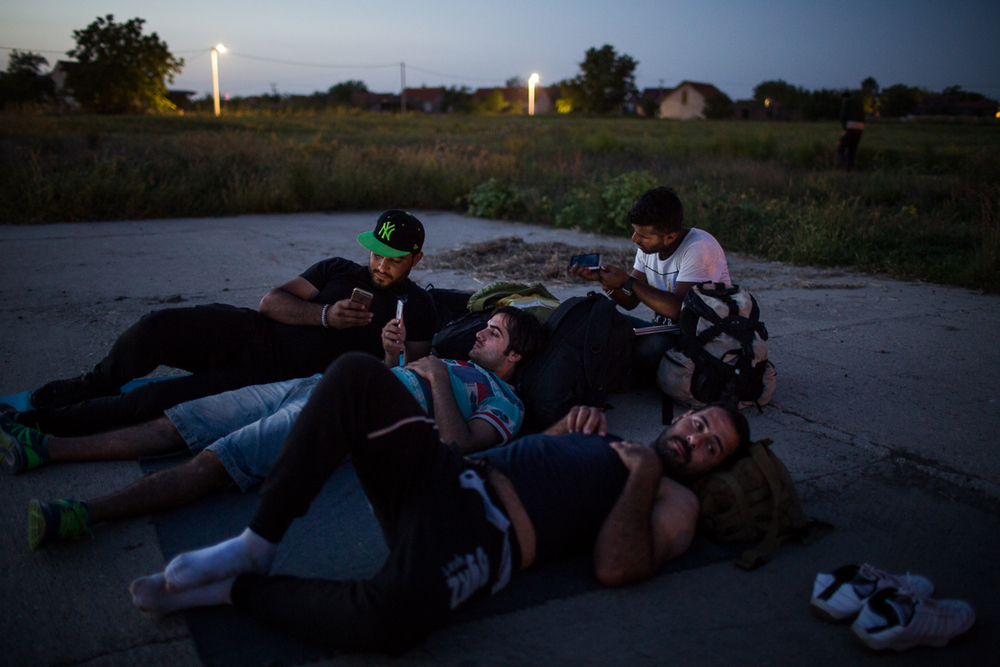
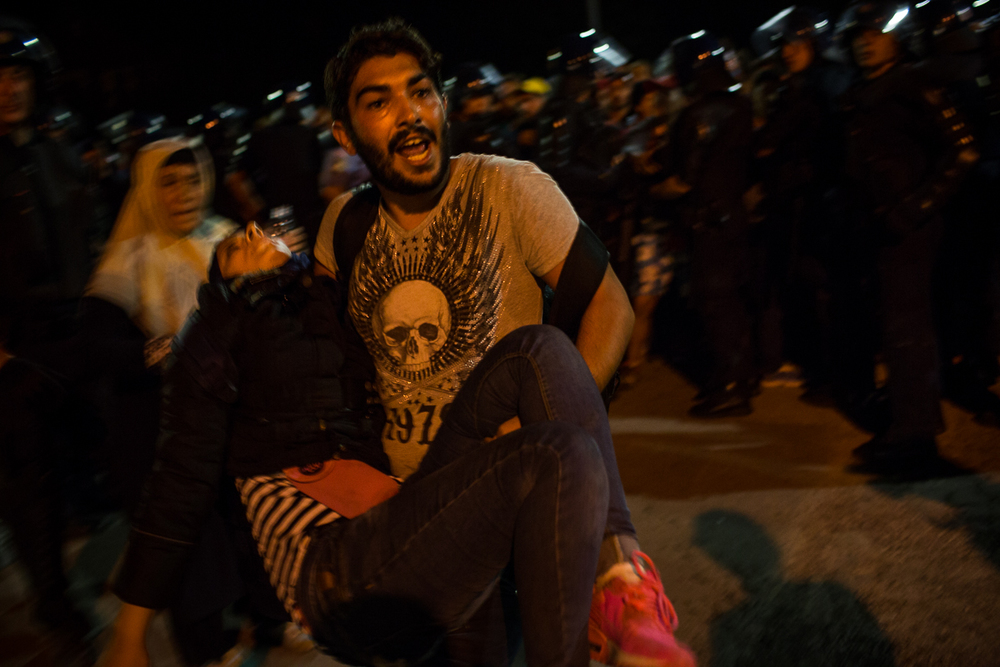
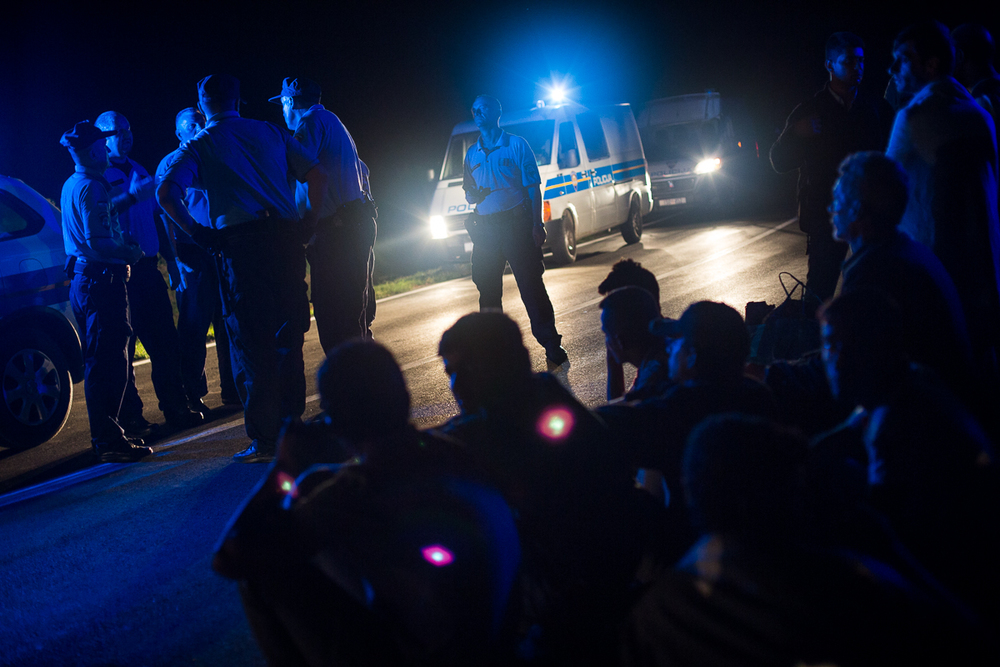
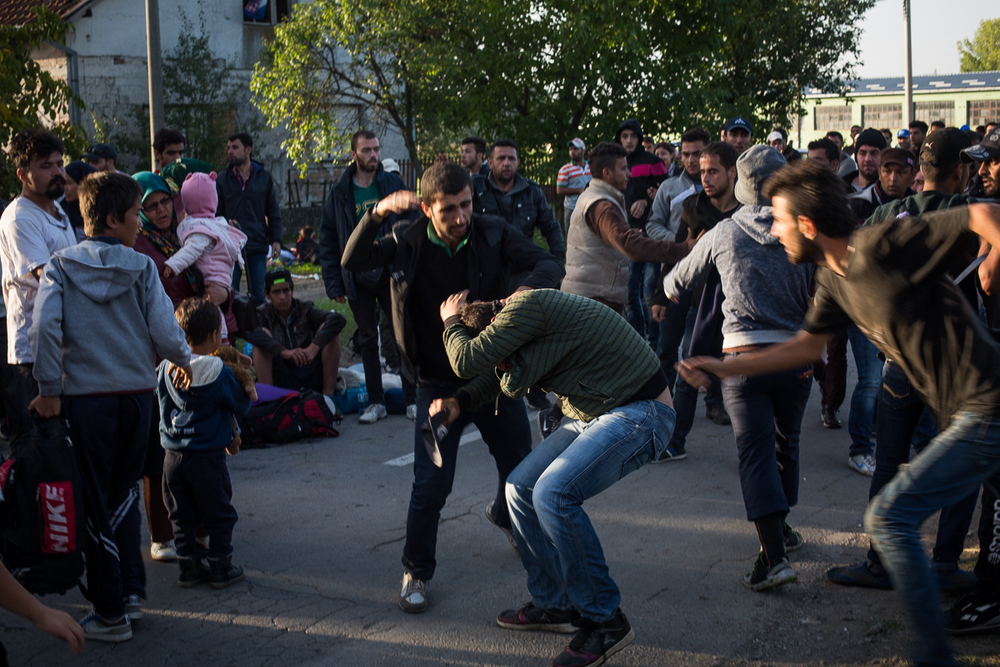
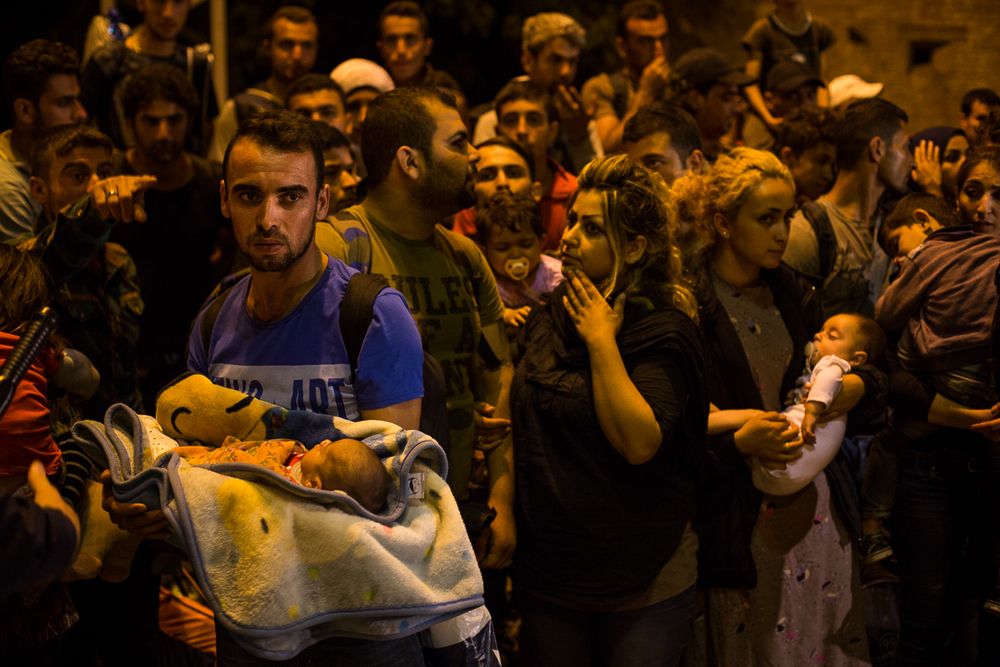
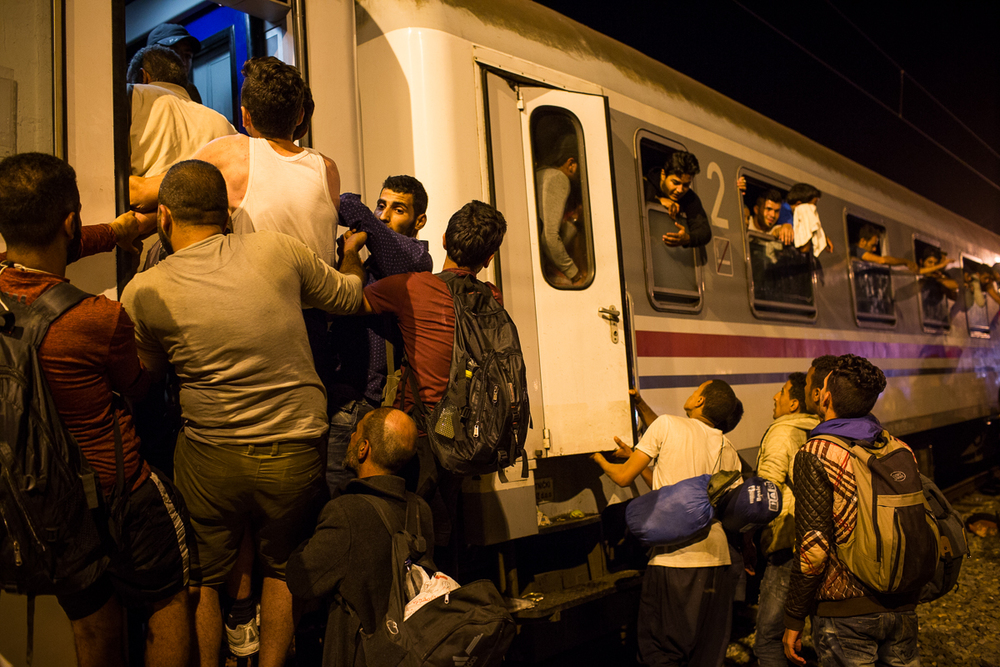

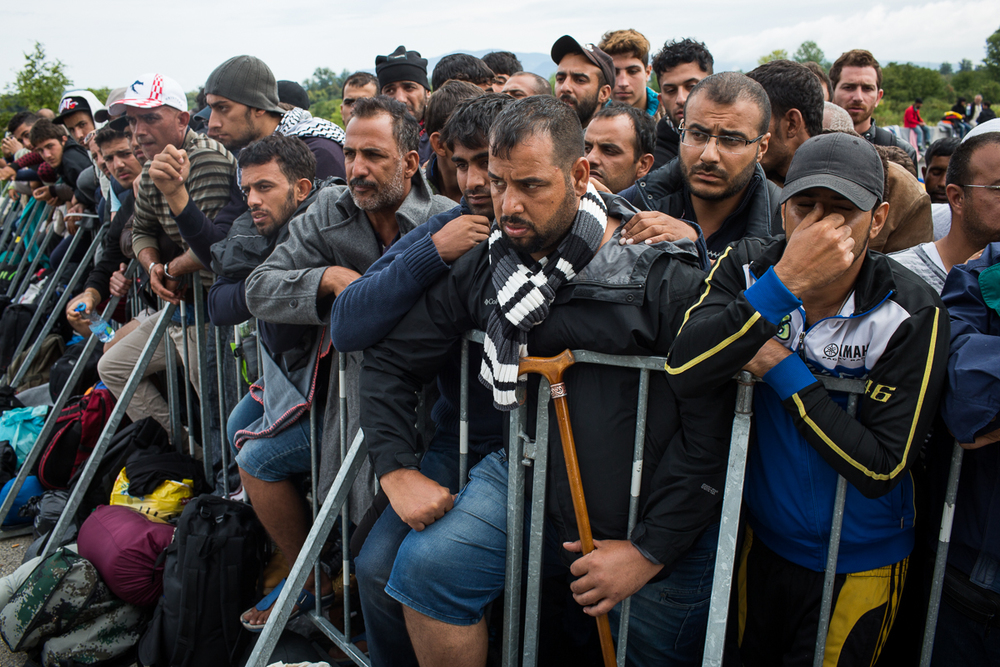
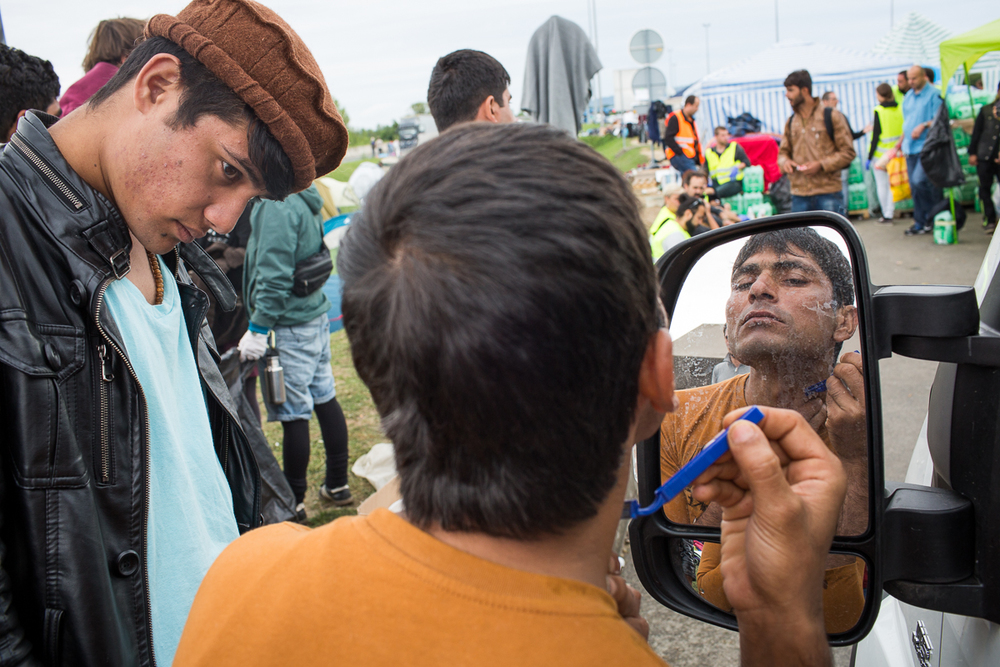
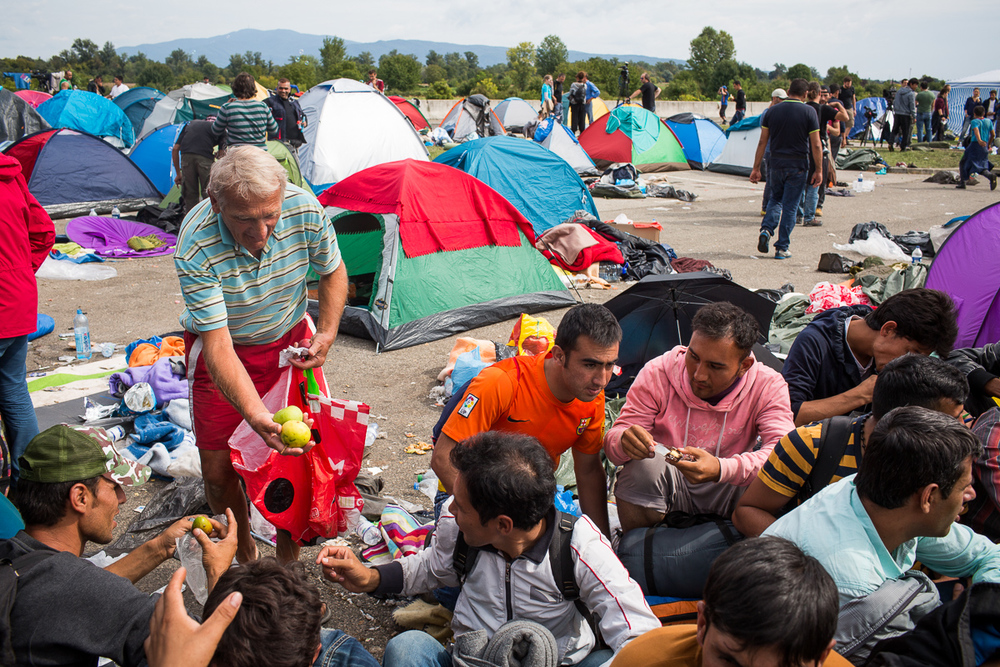
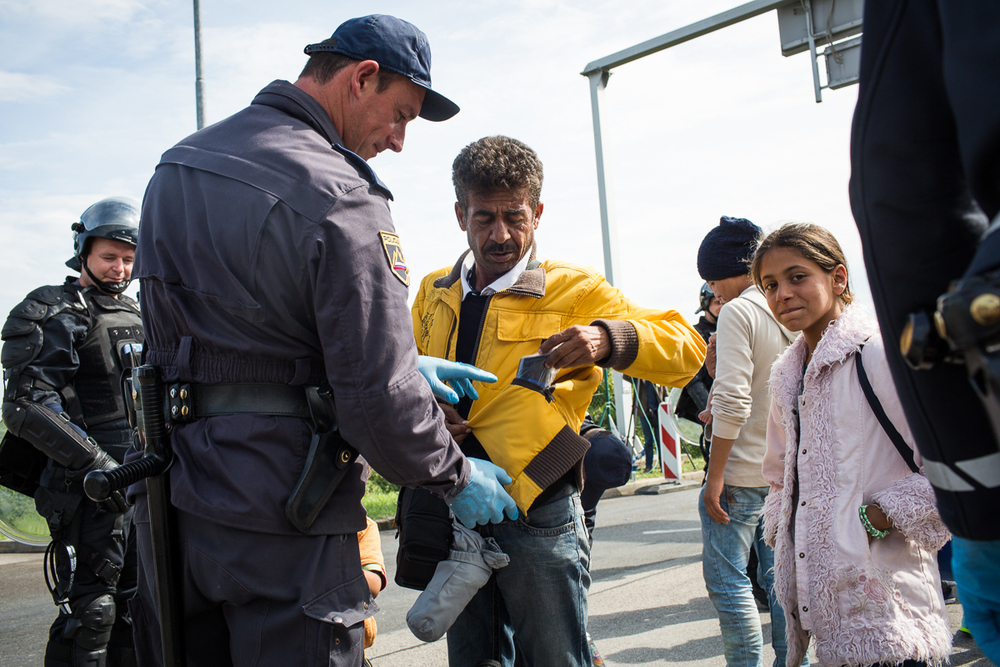
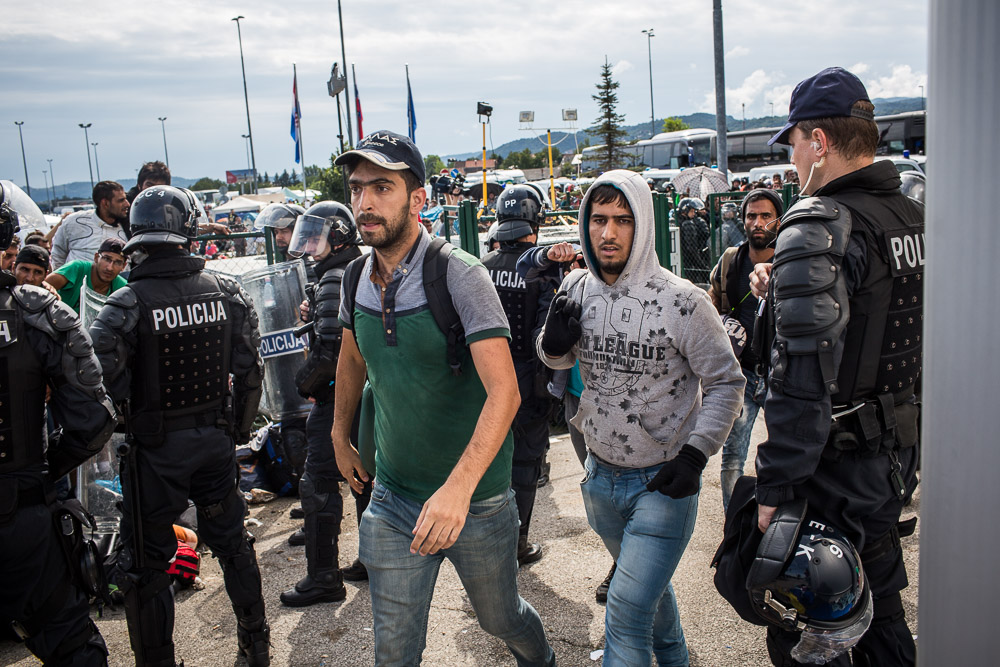




















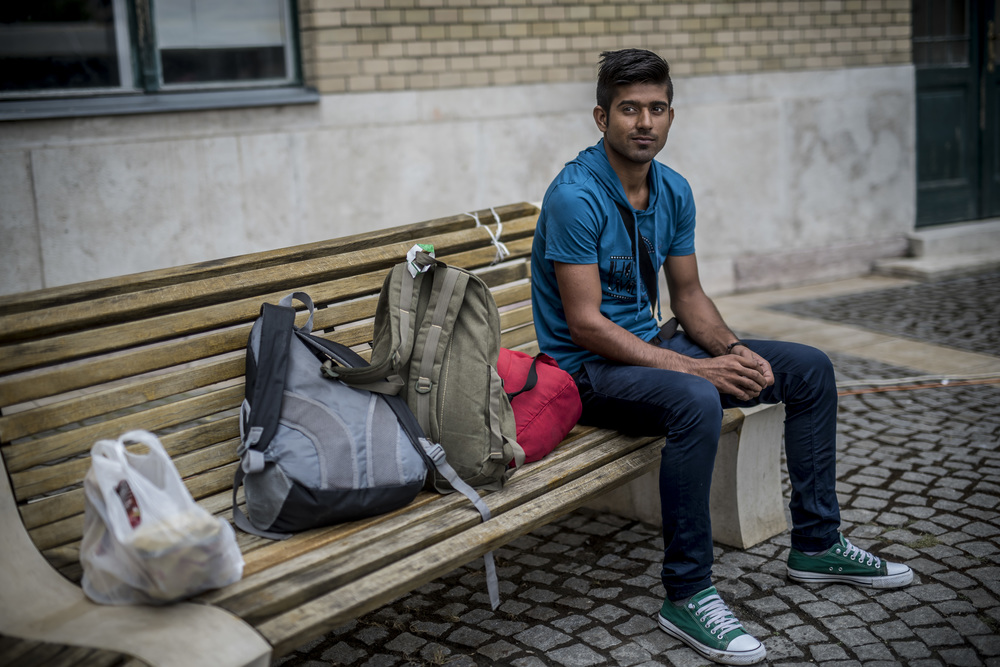























Last year in 2014, the numbers of migrants using the Western Balkan route into the EU reached unprecedented levels. According to Europe’s border agency, Frontex, the Serbian-Hungarian frontier has become the third most popular route into the EU for irregular migrants and asylum-seekers, after Greece and Italy.